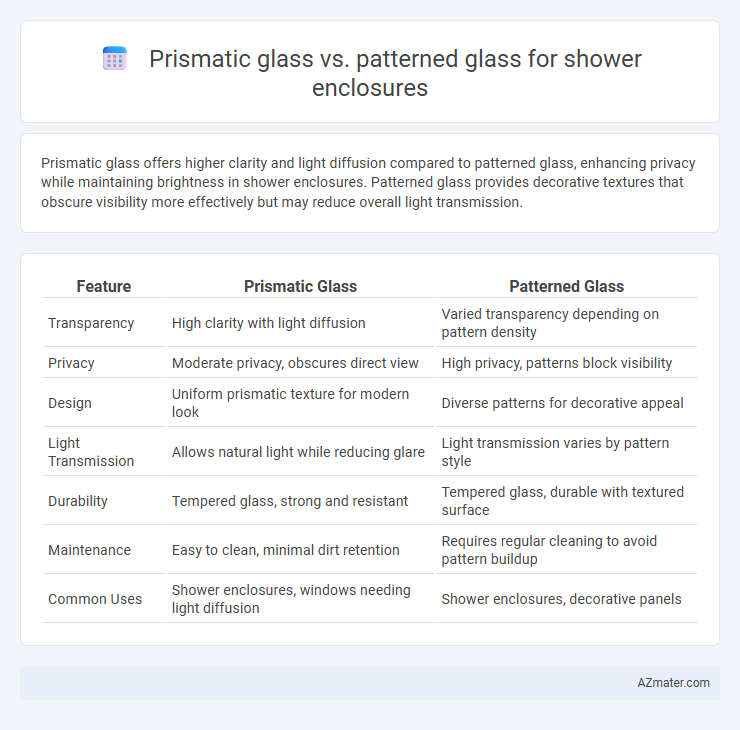Prismatic glass offers higher clarity and light diffusion compared to patterned glass, enhancing privacy while maintaining brightness in shower enclosures. Patterned glass provides decorative textures that obscure visibility more effectively but may reduce overall light transmission.
Table of Comparison
| Feature | Prismatic Glass | Patterned Glass |
|---|---|---|
| Transparency | High clarity with light diffusion | Varied transparency depending on pattern density |
| Privacy | Moderate privacy, obscures direct view | High privacy, patterns block visibility |
| Design | Uniform prismatic texture for modern look | Diverse patterns for decorative appeal |
| Light Transmission | Allows natural light while reducing glare | Light transmission varies by pattern style |
| Durability | Tempered glass, strong and resistant | Tempered glass, durable with textured surface |
| Maintenance | Easy to clean, minimal dirt retention | Requires regular cleaning to avoid pattern buildup |
| Common Uses | Shower enclosures, windows needing light diffusion | Shower enclosures, decorative panels |
Introduction to Shower Enclosure Glass Types
Prismatic glass offers a sleek, modern aesthetic with high light transmission and subtle distortion, enhancing privacy while maximizing brightness in shower enclosures. Patterned glass provides diverse textured designs that effectively obscure visibility, adding decorative elements and increased privacy to bathrooms. Both glass types are durable, easy to clean, and serve functional and aesthetic purposes, catering to different style preferences and privacy needs in shower enclosures.
What is Prismatic Glass?
Prismatic glass is a type of textured glass featuring a three-dimensional pattern that refracts light, enhancing privacy while maximizing natural illumination in shower enclosures. Unlike patterned glass, which often has repeated decorative motifs, prismatic glass utilizes geometric shapes to scatter light and reduce visibility without compromising brightness. This makes prismatic glass ideal for modern bathrooms seeking a balance of aesthetic appeal, privacy, and light diffusion.
What is Patterned Glass?
Patterned glass features textured or raised designs that provide added privacy while allowing light to pass through, making it ideal for shower enclosures. It differs from prismatic glass, which refracts light into distinct patterns without texture, focusing more on visual effects than privacy. Patterned glass is commonly chosen for its ability to obscure visibility while maintaining brightness and enhancing bathroom aesthetics.
Visual Appeal: Prismatic vs Patterned Glass
Prismatic glass offers a modern, sleek appearance with its crisp geometric patterns that enhance light diffusion while maintaining privacy, making it ideal for contemporary shower enclosures. Patterned glass features intricate, decorative textures that add a classic or artistic element, creating a distinct visual interest and a more traditional ambiance. Choosing between prismatic and patterned glass depends on the desired aesthetic effect and level of privacy for the bathroom space.
Privacy Levels: Prismatic vs Patterned Glass
Prismatic glass offers a high level of privacy by diffusing light through its textured design, effectively obscuring shapes and minimizing visibility while maintaining brightness in the shower enclosure. Patterned glass provides varying privacy levels depending on the intricacy and density of the patterns, allowing for more customizable opacity but sometimes less effective at fully concealing silhouettes compared to prismatic options. Choosing between prismatic and patterned glass depends on the desired balance between privacy, light transmission, and aesthetic preference for the shower enclosure.
Light Transmission: Which Glass Performs Better?
Prismatic glass offers superior light transmission by diffusing light evenly while maintaining privacy, making it ideal for shower enclosures where natural brightness is desired. Patterned glass also provides privacy but typically reduces light transmission due to its textured surfaces, which scatter light more irregularly. For maximizing light flow without compromising privacy, prismatic glass performs better compared to patterned glass in shower enclosures.
Maintenance and Cleaning Comparison
Prismatic glass features a textured surface that resists water spots and fingerprints, making it easier to maintain and clean compared to patterned glass. Patterned glass often has intricate designs that can trap soap scum and mineral deposits, requiring more frequent and detailed cleaning. The smooth surface of prismatic glass allows for quicker wiping and less buildup, enhancing its practicality for shower enclosures.
Durability and Safety Features
Prismatic glass offers enhanced durability due to its thicker construction and textured surface, which provides better resistance to impact and scratches compared to patterned glass. Patterned glass, while visually appealing, is typically thinner and may be more prone to chipping or cracking under stress. In terms of safety, prismatic glass is often tempered or laminated, ensuring it breaks into small, less harmful pieces, whereas patterned glass may require additional treatments to meet similar safety standards.
Cost Differences: Prismatic vs Patterned Glass
Prismatic glass for shower enclosures generally costs more than patterned glass due to its advanced light-diffusing properties and higher manufacturing complexity. Patterned glass offers a more budget-friendly option, providing privacy through embossed or textured surface designs while using standard glass materials. Homeowners choosing between the two must consider initial investment versus longevity and aesthetic appeal, with prismatic glass often delivering greater light transmission and durability at a premium price point.
Choosing the Best Glass for Your Shower Enclosure
Prismatic glass offers excellent privacy by diffusing light while maintaining brightness, making it ideal for shower enclosures requiring a balance of seclusion and light transmission. Patterned glass features distinct embossed designs that enhance aesthetic appeal and provide privacy through textured surfaces, suitable for those prioritizing style and individuality in their bathroom design. Selecting the best glass depends on desired levels of privacy, light diffusion, and decorative impact, with prismatic glass excelling in subtle translucency and patterned glass delivering bold, ornamental textures.

Infographic: Prismatic glass vs Patterned glass for Shower enclosure
 azmater.com
azmater.com